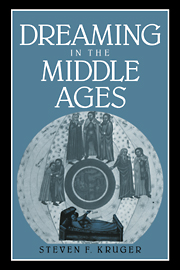Book contents
- Frontmatter
- Contents
- Acknowledgments
- List of abbreviations
- Introduction: modern and medieval dreams
- 1 Dreambooks and their audiences
- 2 The doubleness and middleness of dreams
- 3 The patristic dream
- 4 From the fourth to the twelfth century
- 5 Aristotle and the late-medieval dream
- 6 Dreams and fiction
- 7 Dreams and life
- Notes
- Bibliography
- Index
2 - The doubleness and middleness of dreams
Published online by Cambridge University Press: 22 August 2009
- Frontmatter
- Contents
- Acknowledgments
- List of abbreviations
- Introduction: modern and medieval dreams
- 1 Dreambooks and their audiences
- 2 The doubleness and middleness of dreams
- 3 The patristic dream
- 4 From the fourth to the twelfth century
- 5 Aristotle and the late-medieval dream
- 6 Dreams and fiction
- 7 Dreams and life
- Notes
- Bibliography
- Index
Summary
GOD-SENT OR AGITATED DREAMS
Toward the beginning of his satiric “Dream, or Lucian's Career,” the second-century Greek author Lucian confidently announces that the dream he is about to relate was divinely-inspired:
What you shall hear next, gentlemen, is not to be made light of; it deserves a very receptive audience. The fact is that, to use the words of Homer, “a god-sent vision appeared unto me in my slumber Out of immortal night” [Iliad 2.56–57], so vivid as not to fall short of reality in any way.
After Lucian has recounted his dream, however, he abandons the notion that its source is divine, invoking instead a different kind of oneiric causation: “it was due, I suppose, to my agitation” (p. 231). In one description of the dream, it is a psychological phenomenon; in the other, it comes from an external, and elevated, source. The divine dream “deserves a very receptive audience,” but the psychologically-motivated dream it becomes only inspires the audience's derision:
Even as I was speaking … someone said, “what a long and tiresome dream!” Then someone else broke in: “A winter dream, when the nights are longest … What got into him to tell us this idle tale and to speak of a night of his childhood and dreams that are ancient and superannuated? It is flat to spin pointless yarns. Surely he doesn't take us for interpreters of dreams?”
(p. 231)- Type
- Chapter
- Information
- Dreaming in the Middle Ages , pp. 17 - 34Publisher: Cambridge University PressPrint publication year: 1992



